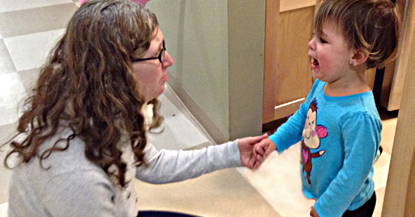
“Much harm has been done in the name of love, but no harm can be done in the name of respect.” -Magda Gerber
The RIE approach* to child development, coalesced by Magda Gerber, is all about trust and respect. We believe that children are born as complete people, with innate capabilities and real emotions. This approach fully recognizes a young child’s ability and gives him or her ample time and space to test it. The adult spends more time observing, taking time to pause before responding. We show children respect by being empathic and understanding to all emotions, whether positive or negative.
We believe that children’s play is their work. As adults, we reflect: How would we feel if someone was constantly interfering during our work day? Would we be able to stay focused on our task? Would we do anything to completion? Would we feel calm and relaxed, or distracted and pressured? As RIE teachers and caregivers, we hold children’s play in the same regard. We refrain from inserting ourselves into it or entertaining a child unless they show that they need us. Through allowing this kind of self-directed play, children learn about themselves and the world around them and become more confident each day.
We allow children to struggle and take risks- both physical and emotional- so that they learn they can solve challenges on their own. We are sure to keep children safe, but do not unnecessarily run to their “rescue”. When children take risks and experience strong emotions as a result, they understand that their actions have consequences. They learn that difficult feelings pass, and they will feel better soon. RIE educators do not take ownership over each child’s emotional experience; instead we allow children to explore the depths of their difficult emotions and stay with them instead of defining it for them (“You’re OK”), fixing it for them (“I’ll kiss it and make it better”), distracting them (“Oh, look at the bird!”) or diminishing feelings (“It’s not so bad”). Instead, we pause purposefully, reflect on what happened, and allow them to decide what to do next.
Just because all emotions are acceptable, doesn’t mean all behaviors are. RIE is very clear about setting boundaries and does so calmly and consistently. Children feel safer when they understand adults are in charge. Their emotions can still be validated while a loving boundary is enforced. “You’re upset because you don’t want to leave. It’s hard to do things you don’t want to do. Do you want to walk to the car or should I carry you?” The world does not stop every time we have an emotion, and it is our job to help children develop strategies to manage their emotions and self-regulate.
When children are treated this way from the time they are born, the outcomes are incredible. They trust that they are strong, capable, and worthy. They are confident that their bodies and brains will take them where they need to go. They are empathetic to the needs and emotions of others, and respect each other’s “no.” They understand that boundaries are set and enforced only when necessary and acknowledge that adults are here to keep them safe. This gives them the freedom to just “be a kid” and explore all that the world has to offer.
*The RIE Approach typically refers to infant and toddlers. At The Nest, we foster this approach all the way through pre-k and sometimes refer to it as Emotionally Responsive Teaching.